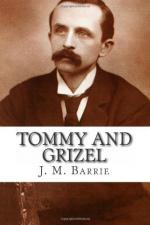So she was not without money, and she was on her way home! The relief it brought him came to the surface in great breaths, and at first every one of them was a prayer of thankfulness. Yet in time they were triumphant breaths. Translated into words, they said that he had got off cheaply for the hundredth time. His little gods had saved him again, as they had saved him in the arbour by sending Grizel to him. He could do as he liked, for they were always there to succour him; they would never desert him—never. In a moment of fierce elation he raised his hat to them, then seemed to see Grizel crying “I woke up,” and in horror of himself clapped it on again. It was but a momentary aberration, and is recorded only to show that, however remorseful he felt afterwards, there was life in our Tommy still.
The train by which he was to follow her did not leave until evening, and through those long hours he was picturing, with horrible vividness and pain, the progress of Grizel up and down that terrible pass. Often his shoulders shook in agony over what he saw, and he shuddered to the teeth. He would have walked round the world on his knees to save her this long anguish! And then again it was less something he saw than something he was writing, and he altered it to make it more dramatic. “I woke up.” How awful that was! but in this new scene she uttered no words. Lady Pippinworth was in his arms when they heard a little cry, so faint that a violin string makes as much moan when it snaps. In a dread silence he lit a match, and as it flared the figure of a girl was seen upon the floor. She was dead; and even as he knew that she was dead he recognized her. “Grizel!” he cried. The other woman who had lured him from his true love uttered a piercing scream and ran towards the hotel. When she returned with men and lanterns there was no one in the arbour, but there were what had been a man and a girl. They lay side by side. The startled onlookers unbared their heads. A solemn voice said, “In death not divided.”
He was not the only occupant of the hotel reading-room as he saw all this, and when his head fell forward and he groaned, the others looked up from their papers. A lady asked if he was unwell.
“I have had a great shock,” he replied in a daze, pulling his hand across his forehead.
“Something you have seen in your paper?” inquired a clergyman who had been complaining that there was no news.
“People I knew,” said Tommy, not yet certain which world he was in.
“Dead?” the lady asked sympathetically.
“I knew them well,” he said, and staggered into the fresh air.
Poor dog of a Tommy! He had been a total abstainer from sentiment, as one may say, for sixty hours, and this was his only glass. It was the nobler Tommy, sternly facing facts, who by and by stepped into the train. He even knew why he was going to Thrums. He was going to say certain things to her; and he said them to himself again and again in the train, and heard her answer. The words might vary, but they were always to the same effect.




